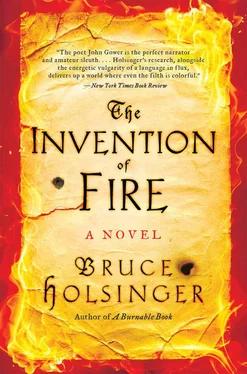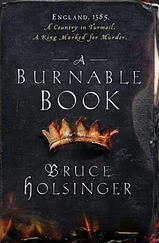Bruce Holsinger - The Invention of Fire
Здесь есть возможность читать онлайн «Bruce Holsinger - The Invention of Fire» — ознакомительный отрывок электронной книги совершенно бесплатно, а после прочтения отрывка купить полную версию. В некоторых случаях можно слушать аудио, скачать через торрент в формате fb2 и присутствует краткое содержание. Год выпуска: 2015, Издательство: HarperCollins, Жанр: Исторический детектив, на английском языке. Описание произведения, (предисловие) а так же отзывы посетителей доступны на портале библиотеки ЛибКат.
- Название:The Invention of Fire
- Автор:
- Издательство:HarperCollins
- Жанр:
- Год:2015
- ISBN:нет данных
- Рейтинг книги:3 / 5. Голосов: 1
-
Избранное:Добавить в избранное
- Отзывы:
-
Ваша оценка:
- 60
- 1
- 2
- 3
- 4
- 5
The Invention of Fire: краткое содержание, описание и аннотация
Предлагаем к чтению аннотацию, описание, краткое содержание или предисловие (зависит от того, что написал сам автор книги «The Invention of Fire»). Если вы не нашли необходимую информацию о книге — напишите в комментариях, мы постараемся отыскать её.
The Invention of Fire — читать онлайн ознакомительный отрывок
Ниже представлен текст книги, разбитый по страницам. Система сохранения места последней прочитанной страницы, позволяет с удобством читать онлайн бесплатно книгу «The Invention of Fire», без необходимости каждый раз заново искать на чём Вы остановились. Поставьте закладку, и сможете в любой момент перейти на страницу, на которой закончили чтение.
Интервал:
Закладка:
In their chamber, seated before him on the floor, she warmed the soap with the water and lathered her hands. The lye filled the air between them with a sweet and homely scent, reminding her of another, less trying time.
“Your knife,” she said. He reached behind himself for the knife, which he placed on the floor between them.
First she worked the soap through his beard. The hairs were not overly long but dark, rich, thick with the scents of woodsmoke and travel. Their rough ends abraded her fingertips like sand or soil. His cheeks moved beneath them, bulging up to his surprised eyes, lowering to thicken his jaw. She reached for more soap and spread the lather on his neck, used her palms to smooth the creamed lye down along the gentle slope to the top of his chest. She rinsed her hands, dried them on her dress, then reached for the knife.
Her hands hesitated before his face. Yet how difficult could it be? She pictured Thomas, the barber-surgeon who shaved her father over all those years. Twice a month he would arrive with his straight knife and his gangly apprentice, to stand out in the manor foreyard, beneath the small elm, and service the whiskers of his lordship, who had always preferred the blade to the pumice stone for his shaves. He would sit in his great hall chair, brought outside by two servants for the occasion, obeying Thomas’s instructions to tilt his head to the left, to lean back, to raise his chin. It was the same Thomas who would cut open her mother, saving her last child while leaving her to die of flux in the wake of the birth. Part of her hated the man after that, but the shavings continued without a pause. She remembered the quick and expert flicks of the blade, the pleasing rasp as steel met skin.
Her own hands moved slowly, inching the flat edge of the blade along his cheeks, gathering hair and lye in a humped line, like a row of raised dirt between furrows. She stretched his skin, scraped his neck, fingered his ears. His eyes never left hers as the knife discovered those angles and dimensions of his face she had not yet noticed, much less appreciated, but now had time to sculpt and clean.
She cut him twice. A nick below his left ear, easily stanched. Another above his upper lip, to which he held his sleeve as she cleaned the blade. She looked at him. Without his beard he appeared if anything more of a gentleman, not less, despite the current fashion. A high brow now fitting to his face, eyes that could look both kind and severe, a strong jaw keeping a rigid course to below his ears before angling up to frame his lower hairline.
He flexed his jaw as she inspected him. He took her hand. “A while longer, Elizabeth,” he said to her, in that new voice he’d learned. “Give me the smallest while, then I shall join you out front. Go now.”
He emerged from their chamber in the middle of the afternoon, his back straight, his eyes clear, his chin right where it should be. He said nothing to the widow, keeping a distance from the new pilgrims joined to their company.
From the next bench she watched him eat a sop. The morning bread was gone, so he sipped the thin broth from a shallow tin bowl. The tendons along his newly clean neck pulsed with his generous swallows, hardly tentative yet not too large for a gentleman. She admired her work.
Early the next morning, with the dead pilgrim in the ground, the joined companies gathered in the yard, where the din of departure brought the keeper’s dogs from the barn to nuzzle and sniff for scraps. The inn’s stableboys led the horses to the blocks, then locked hands and pushed their guests’ feet to get everyone mounted in turn. As she adjusted herself on the animal’s back her own helper stood by, his young eyes aglint with hope. Once astride she pressed a penny into his hand, and almost flinched at the touch of his skin, which despite the boy’s youth was the texture of his, and jolted her accordingly.
The boy or someone else had stuffed her saddle well. It filled the width between her upper thighs with a pleasing firmness, rubbing her just there as the horse’s muscled back worked beneath her and a confessor’s old injunction sang in her mind. The saddle of thine horse shall be patience and purity, that thou may be patient in adversity and pure in the flesh. Not my saddle, she mused as she followed Robert through the wooden gate, thrown open to the road for the company’s departure. The saddle of mine horse shall be lust and want, that I may be quick in swinking and sated in the bed. She shuddered, let out a held breath.
They left the village at the stroke of seven, twenty pilgrims strong. A few last houses, thatched roofs and low-cut hay, a sheepfold spilling onto a heath; groan of leather adjusting to new use, clank of pans on the cook’s packhorse.
The widow shared a nag with her son, and as the company rounded the first bend in the road Margery turned to look at the woman’s face, wan and sad. All that day she watched the widow carefully, observing the ways she tended to her son, now able to sit up on the saddle against his mother. Their occasional weeping was a sad music to the fellowship as the diminished family mourned the loss of a father and husband to a highwayman’s blade.
It was the boy who gave them away. The pilgrims had stopped for a rest and refreshment, just short of a wide area where the road had been washed out by a crossing stream. The horses were led to the water, and the women spread food on blankets up along the higher bank. Later, as they remounted and rode from their rest, the woman and her son started to edge closer. The boy was whispering to his mother, his eyes on them. On him, Robert.
The company forded another, smaller stream. A step, a light jump, the horses having no trouble managing the crossing. Once on the far bank the widow and her son closed the distance, and when they were alongside she looked him full in the face. “Why, you are Faulk! I knew it,” the widow said, too loudly. Several of the other pilgrims turned toward them, their curiosity sparked by the widow’s first words in hours.
“Mistress?” he said with a frown, his smooth chin raised, his gaze fixed on the road ahead.
Margery watched the exchange, pondered how to stop it.
“Robert Faulk, as I spit and kick,” said the widow, inching her horse closer. “Why, you been the cook in Bladen Manor for nigh on ten years, and here you be, astride a fancy saddle in rich jet, acting a gentleman’s part.”
Margery watched him. Do not flinch. He remained impassive as he said to the widow, “You are mistaken, mistress.”
“Mistaken?” she scoffed. “Don’t you twist words with me, Robert Faulk. Why, you’re a famed poacher in our parts, a bowman to match a king’s archer you are! Selling your coneys and your hinds, the hides and the meat, door to door up and down the shire. ’Twas my young Will here, was he knew your face.”
“That’s Robert Faulk, sure,” said the boy, looking shyly up from beneath his hood. “Well met, Rob.”
Margery edged her horse forward, coming between Robert and the widow. “I am afraid you have mistaken my husband for another man, good mistress,” she said, trying to sound kind, reaching to place a protective hand on his arm. “He is Antony Brampton, an esquire en service of Sussex.” A condescending smile to put a nosing widow in her place. “Hardly a cook, I should think.”
“Though I do admire the craft of cookery greatly, my good mistress,” he said seamlessly, his voice almost jovial. Margery looked at him in awe. “My father’s family has employed a long, strong line of cooks in the manor kitchens for many generations. Their surname is Bolt, and there is a story about one of them from King Edward’s reign that your son here might enjoy. What is your name, young fellow?”
Читать дальшеИнтервал:
Закладка:
Похожие книги на «The Invention of Fire»
Представляем Вашему вниманию похожие книги на «The Invention of Fire» списком для выбора. Мы отобрали схожую по названию и смыслу литературу в надежде предоставить читателям больше вариантов отыскать новые, интересные, ещё непрочитанные произведения.
Обсуждение, отзывы о книге «The Invention of Fire» и просто собственные мнения читателей. Оставьте ваши комментарии, напишите, что Вы думаете о произведении, его смысле или главных героях. Укажите что конкретно понравилось, а что нет, и почему Вы так считаете.












